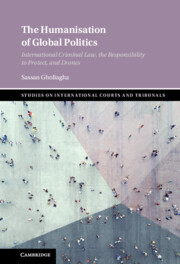 The Humanisation of Global Politics
The Humanisation of Global Politics Book contents
- The Humanisation of Global Politics
- Studies on International Courts and Tribunals
- The Humanisation of Global Politics
- Copyright page
- Dedication
- Contents
- Figures
- Tables
- Preface
- Acknowledgements
- Materials Used
- Abbreviations
- 1 The Humanisation of Global Politics
- 2 Humanisation in IR Theory and International Law
- 3 The Social Construction of the Individual Human Being
- 4 Guilty and Innocent
- 5 Heuristics and Positions
- 6 Protecting the Individual Human Being from Mass Atrocities
- 7 Killing the Individual Human Being via Drones
- 8 The Individual Human Being as a Theoretical Category
- Appendices
- References
- Index
6 - Protecting the Individual Human Being from Mass Atrocities
Published online by Cambridge University Press: 25 August 2022
- The Humanisation of Global Politics
- Studies on International Courts and Tribunals
- The Humanisation of Global Politics
- Copyright page
- Dedication
- Contents
- Figures
- Tables
- Preface
- Acknowledgements
- Materials Used
- Abbreviations
- 1 The Humanisation of Global Politics
- 2 Humanisation in IR Theory and International Law
- 3 The Social Construction of the Individual Human Being
- 4 Guilty and Innocent
- 5 Heuristics and Positions
- 6 Protecting the Individual Human Being from Mass Atrocities
- 7 Killing the Individual Human Being via Drones
- 8 The Individual Human Being as a Theoretical Category
- Appendices
- References
- Index
Summary
Chapter 6 presents the second of the three case studies: Protecting the Individual Human Being from Mass Atrocities. The case study offers a critical discussion of the literature and the development of R2P. The chapter then analyses the discourse on Libya and Syria concerning actions to protect civilians and the potential use of force to do so. The analysis focuses mainly on UN Security Council deliberations. Finally, the chapter demonstrates how the individual human being appears in the discourse on protection as innocent civilians or guilty perpetrators or terrorists. As will be demonstrated, this matters for enabling a politics of protection. By analysing the debate on the intervention in Libya in 2011 and dealing with the conflict in Syria, mainly focusing on the years 2011 to 2015, respectively, I demonstrate how these politics of protection play out
Keywords
- Type
- Chapter
- Information
- The Humanisation of Global PoliticsInternational Criminal Law, the Responsibility to Protect, and Drones, pp. 118 - 159Publisher: Cambridge University PressPrint publication year: 2022
